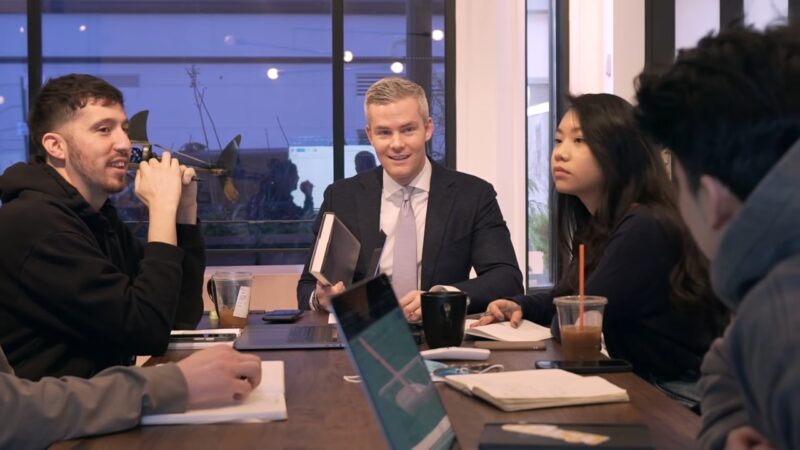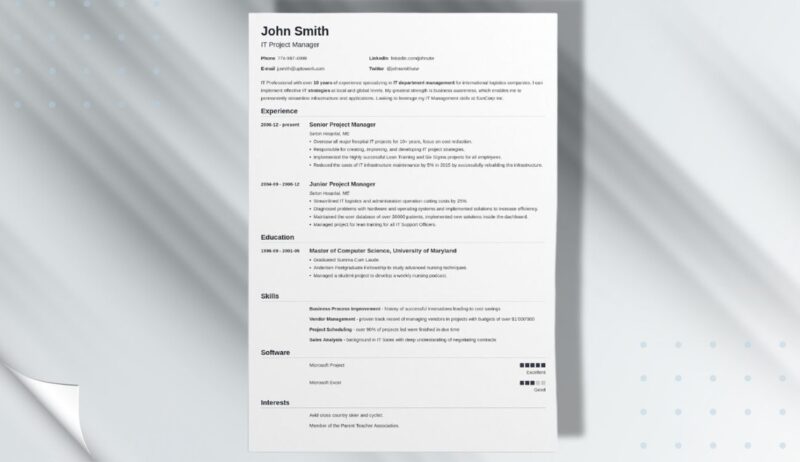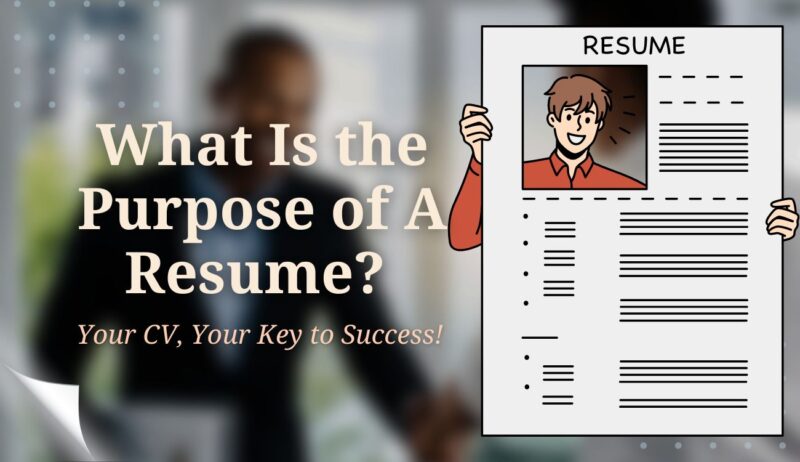Your resume is not just a boring history of your work. Think of it as a superhero tool in your professional adventure. It shines a spotlight on your awesome skills, convinces employers you’re the one, and reflects the incredible professional that you are!
Today we’ll help you with understanding its significance and writing a resume that will ensure you a good presentation on your next job interview.
Reflecting on Your Professional Self

Your resume is the first impression an employer gets of you. It tells the story of your professional career, showcasing your skills, experiences, and achievements.
A Showcase of Skills
The primary purpose of this document is to demonstrate your professional abilities. It serves as a platform to showcase your skill sets and technical knowledge, which are essential in any job position. By detailing your abilities, employers can gauge whether your expertise aligns with what they are looking for in a potential candidate.
While a job description outlines the ideal candidate’s required skills, your resume should match these skills with concrete examples from your past experiences. For example, if a job description requires excellent communication skills, you could highlight your experience as a sales representative where you successfully negotiated with clients.
Career Timeline and Achievements
Your resume also serves as a timeline of your professional journey. It details where you have worked, for how long, and what responsibilities you have undertaken. In doing so, it outlines your career growth, showcasing your progress and commitment to your field.
If you highlight your achievements, this document can make you stand out from other applicants. For example, if you managed to reduce costs by a significant percentage in your previous role, make sure to mention it.
Tangible metrics offer a concrete representation of your successes, helping employers understand the potential value you could bring to their organization.
Marketing Yourself

Apart from reflecting your professional history, your CV is also your personal marketing tool. It’s your opportunity to market your abilities and convince employers that you are the perfect fit for their team.
Positioning Yourself as a Value Addition
Your CV needs to position you as a valuable addition to the prospective employer. It needs to communicate clearly how hiring you will benefit the organization. This can be done by aligning your skills, experiences, and accomplishments with the job requirements and the company’s objectives.
This document should make a compelling argument for your candidacy. It should demonstrate how you have used your skills and expertise to drive results in previous roles, and how you can do the same in the potential job. Remember, employers are not just hiring a candidate with the right skills, but also one who can deliver exceptional results.
Differentiating You from the Competition
In today’s competitive job market, a generic CV won’t cut it. Your resume needs to differentiate you from other candidates, highlighting what makes you unique. This can be done by showcasing your unique skills, experiences, and achievements.
Perhaps you have a rare certification in your field or you have extensive experience working with a particular software tool. Maybe you’ve led large teams or worked on high-stake projects. Whatever it is that sets you apart, make sure it shines through in your CV.
Facilitating Your Job Search

The job search process can be overwhelming, but a well-crafted resume can make it smoother. CV is not just a document you submit to employers; it also serves as a tool that guides your job search and interview process.
Guiding Your Job Search
When crafting this document, you’re forced to take a close look at your professional journey, your skills, your experiences, and what you want in your next role. This introspection can guide your job search, helping you identify the roles and industries that align with your qualifications and career goals.
Having a clear understanding of what you bring to the table and what you’re looking for can make your job search more targeted and efficient. Instead of applying to any and every job, you can focus your efforts on opportunities that fit your career trajectory.
Preparing You for Interviews
A well-prepared resume also prepares you for job interviews. Your CV forms the basis of many interview questions. Interviewers often ask you to elaborate on the experiences and achievements listed in your document.
By crafting a comprehensive and truthful CV, you essentially prepare a roadmap for your interviews. It helps you anticipate questions and prepare thoughtful responses. Plus, it allows you to direct the conversation toward your strengths, reinforcing the narrative that you’re the best candidate for the job.
The purpose of a resume goes beyond summarizing your professional history. It serves as a mirror reflecting your professional self, a tool for marketing your abilities, and a guide facilitating your job search and interview process.
Understanding these purposes can help you craft a CV that is not just informative but also compelling, giving you an edge in your career journey.
An Instrument of Networking

A well-constructed CV is a tool that helps facilitate your professional network, helping you connect with potential employers, colleagues, and industry leaders.
Establishing Professional Relationships
Your resume doesn’t exist in a vacuum. It often serves as the initial point of contact between you and potential employers, paving the way for further professional interactions. For instance, it might impress a hiring manager, prompting them to reach out for an informational interview, even if there isn’t a current job opening.
Or, after submitting your CV, a colleague might notice shared interests or experiences, leading to a valuable professional connection. A robust, well-thought-out resume can lay the groundwork for these kinds of relationships, expanding your professional network.
Facilitating Industry Connections
Your resume also helps connect you with individuals and entities in your industry. As a written record of your professional journey, it can highlight shared experiences or areas of interest that can serve as talking points in networking events, professional gatherings, or industry forums.
By sharing your CV on professional networking sites like LinkedIn, you can reach a wider audience of industry peers, thought leaders, and potential employers. This enhances your visibility within your field, opening up more opportunities for professional growth and collaboration.
A Living Document of Your Professional Evolution

While often viewed as a static document, a resume is a dynamic record of your professional growth and evolution. It should change and develop as you gain more experience, learn new skills, and achieve new milestones.
Recording Your Professional Development
Your resume serves as a logbook, capturing your journey through the professional world. Each new job, every project completed, and all the skills acquired add to your resume, reflecting your ongoing professional development.
This not only shows potential employers that you’re an active participant in your career, but it also gives you a sense of accomplishment. Looking back at your resume, you can see your growth, understand the paths you’ve traversed, and better plan for future career trajectories.
Facilitating Personal Growth
Finally, a resume doesn’t only chart your professional growth; it can also spur personal growth. The process of creating and updating your CV involves introspection, forcing you to consider your weaknesses, strengths, and career aspirations.
Through this self-reflection, you can identify areas you need to develop, set personal goals, and map out a career path that aligns with your values and ambitions. Thus, the act of crafting this document can serve as a catalyst for personal and professional growth, moving you forward in your career journey.
How to Write a Resume?
Crafting a compelling resume is a crucial step in your job search. It’s your ticket to landing interviews and securing the job you’re aiming for. In this guide, we’ll take you step by step through the process of writing a resume that stands out.
| Steps in Resume Writing | Key Points |
|---|---|
| Understand the Job Requirements | 1. Analyze the job posting. 2. Research the company. |
| Choose the Right Resume Format | 1. Chronological format for a strong work history. 2. Functional format for career changers or those with gaps in employment. |
| Write Compelling Content | 1. Start with contact information and summary/objective. 2. Detail work experience, skills, and education. |
| Review and Refine | 1. Proofread for errors. 2. Get feedback. |
FAQs:
1. Can a resume be enhanced with design elements and graphics?
While creativity is appreciated, it’s generally best to keep the document professional and easy to read. Avoid excessive graphics that may distract from the content.
2. What is the role of keywords in it?
Keywords are essential because many companies use applicant tracking systems (ATS) to screen resumes. Including relevant keywords increases the chances of passing through the initial ATS scan.
3. Is it appropriate to include salary expectations on a CV?
No, salary expectations should be discussed during the interview process and not included on the resume.
4. Is it acceptable to use a template for creating this document?

Yes, using a professionally designed template can help ensure a polished and organized resume. However, customize it to suit your individual information and avoid generic templates.
5. Can it be submitted in formats other than PDF?
To ensure compatibility and maintain the document’s formatting, it’s best to submit a resume in PDF format unless the employer specifies otherwise.
Final thoughts
Writing a resume is more than just listing your work history, skills, and education—it’s a strategic process of presenting yourself as the ideal candidate for a specific role. Moreover, it’s essential to remember that a CV is a dynamic document, which should be continually updated and tailored to match the specifics of each job you’re applying for.
In the end, a well-crafted resume doesn’t guarantee a job offer, but it does significantly increase your chances of landing an interview—the crucial first step in your journey toward securing your ideal job.
Armed with the insights and strategies we’ve discussed, you’re now well-equipped to create a CV that stands out, effectively highlighting your skills, experience, and potential to prospective employers. So go ahead, put these principles into practice, and take a significant step towards your next professional milestone.

